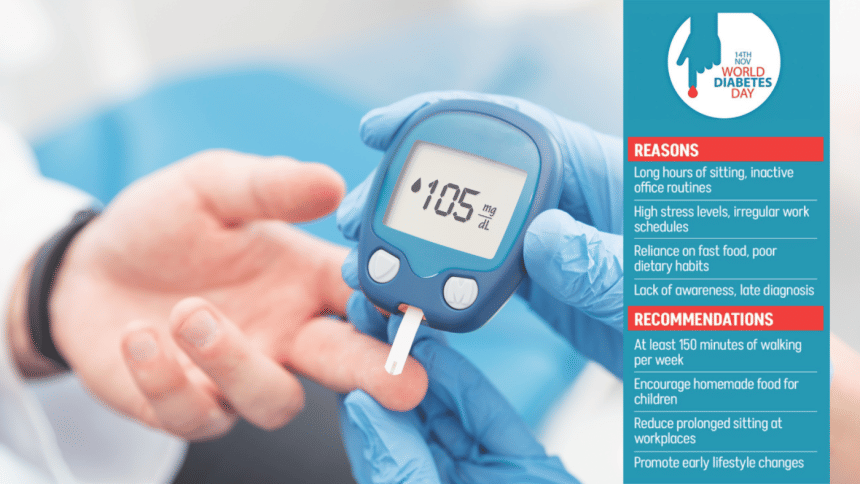Unhealthy lifestyle, stress fuelling diabetes surge

Sumon Kabir (pseudonym), an employee at a private firm in the capital, leads a lifestyle familiar to many urban professionals.His office has a canteen, but he often cannot eat there as he usually works outside during lunch hours. Instead, he relies on fast food.Once back at work, Sumon spends most of his day in front of a computer, rarely taking breaks. His job also involves considerable stress."One day, my office arranged a diabetes test, and I reluctantly took part," he told The Daily Star rec...
Sumon Kabir (pseudonym), an employee at a private firm in the capital, leads a lifestyle familiar to many urban professionals.
His office has a canteen, but he often cannot eat there as he usually works outside during lunch hours. Instead, he relies on fast food.
Once back at work, Sumon spends most of his day in front of a computer, rarely taking breaks. His job also involves considerable stress.
"One day, my office arranged a diabetes test, and I reluctantly took part," he told The Daily Star recently. "I was shocked when the results showed that my blood sugar level was very high. I had no idea I had diabetes. Now I have to manage it carefully."
Health experts say lifestyles like Sumon's -- marked by long hours of sitting, stress and unhealthy eating -- are a direct path to diabetes.
Like him, thousands of people are developing diabetes due to poor lifestyle choices, unhealthy diets, stressful office environments and a lack of awareness, experts said.
According to the International Diabetes Federation (IDF), about 1.38 crore people in Bangladesh have diabetes. However, health experts believe the actual number is higher, posing a serious burden on the healthcare system and economy.
Amid the situation, Bangladesh, along with the rest of the world, is observing World Diabetes Day today. This year, the IDF has focused its campaign on "Diabetes and the Workplace" to raise awareness among working populations.
The IDF introduced World Diabetes Day in 1991, and the United Nations recognised it officially in 2007.
RISE IN DIABETIC PATIENTS
In an article published by the Diabetic Association of Bangladesh, Dr Faruque Pathan, director (academy) at Birdem General Hospital, wrote that one in four adults in Bangladesh may now be diabetic.
If this estimate is accurate, the total number of patients could exceed three crores, he noted, warning that the situation will worsen if current trends continue.
Although he did not specify the data source, an association official said a 2018 nationwide survey of one lakh adults found that one in four was diabetic.
The rise is also reflected in hospital data. According to the association, the number of registered diabetic patients increased from 35.10 lakh in 2015–16 to 65 lakh in 2023–24.
National Professor AK Azad, president of the Diabetic Association of Bangladesh, said although no recent nationwide data are available, the trend clearly shows a rapid rise.
He said around 50 percent of patients with diabetes are unaware of their condition, meaning the true number is likely much higher.
LIFESTYLE, FOOD HABITS TO BE BLAMED
At a press conference held yesterday at Ibrahim Cardiac Hospital to mark World Diabetes Day, experts discussed the reasons behind the increase and possible preventive measures.
Prof Azad said office workers are particularly vulnerable because they sit for long hours and have limited opportunities for physical activity. He also noted that urban areas often lack spaces for walking or other physical activities.
"Busy parents often give their school-going children money instead of homemade food, which encourages them to eat fast food," he added.
These factors are among the main reasons behind the rising number of diabetic patients in the country, he said.
Prof Mirza Mahbubul Hasan, director general of Birdem, said prolonged sitting is "as bad as smoking", and physical activity is essential to prevent diabetes. A change in lifestyle, he added, is critical.
Prof Sahela Nasrin, chief executive officer of Ibrahim Cardiac Hospital and Research Institute, said the habit of walking should begin at an early age.
"At least 150 minutes of walking per week and simple exercises three times a week can help prevent diabetes," she said.
Prof Arup Ratan Choudhury, visiting professor at Birdem's dental surgery department, added that tobacco use is another major risk factor.
Md Sayef Uddin, secretary general of the association, said raising awareness is key to prevention and that the organisation is working in various ways to promote this message.